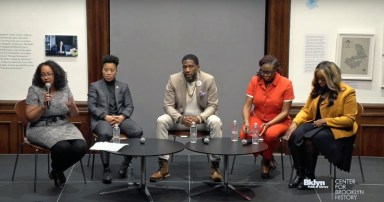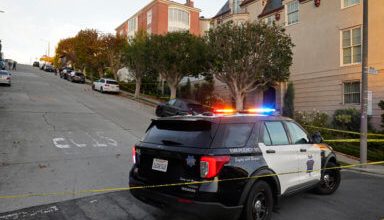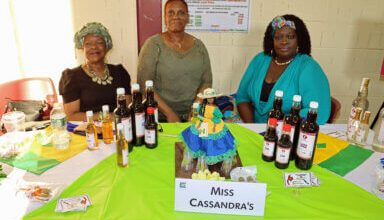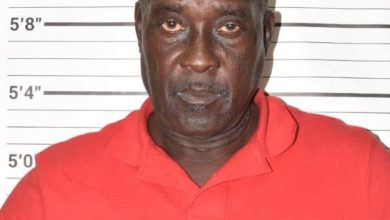How the impact of slavery is still being felt in New York today

On Jan. 21, in a hybrid conversation hosted by the Brooklyn Public Library’s Center for Brooklyn History (BPL-CBH), NYC Council Members Crystal Hudson, Nantasha Williams, and Farah Louis, along with Public Advocate Jumaane Williams, discussed their efforts to acknowledge and address the legacy and impact of slavery and racial injustices in New York City.
This event is part of CBH’s ongoing series Just Conversations with Brooklyn Org and was presented in partnership with Brooklyn Public Library’s Diversity, Equity, and Inclusion Council. Linda Tigani, Executive Director of the NYC Commission on Racial Equity (CORE), moderated it.
According to the NYC Council press release published on Sep. 12, 2024, which referenced a 2015 blog from the New York Public Library, “For over 200 years, the City of New York legally sanctioned the wrongful enslavement of human beings of African and Indigenous American descent. In the early 1700s, the city had one of the highest rates of slave ownership in the country, with between 15 and 20 % of the population being held in slavery.”
The package of legislation sponsored by the Council Members and the Public Advocate contains four bills, currently in the introductory stage. The first is Introduction 242-A, sponsored by Council Member Crystal Hudson, representing District 35 in Brooklyn (Crown Heights, Prospect Heights, Clinton Hill, and Fort Greene).
According to the press release, this bill “would require the Commission on Racial Equity (CORE) to establish a Truth, Healing, and Reconciliation process in connection with the City’s historic involvement in slavery and its present-day legacies.”
Hudson said, “Int. 242 will move New York City forward in a way that places the pursuit of truth and justice at our city’s core. And it is my hope that as the nation’s largest city — with the biggest municipal budget — our truth, healing, and reconciliation process will work; it will identify racist, anti-Black policies at the foundation of our city’s institutions, and it will yield material solutions to address these foundational cracks.”
The second bill in the package is Introduction 279-A, sponsored by Council Member Farah Louis, who represents District 45 in Brooklyn (East Flatbush, Flatbush, Midwood, Flatlands, and Marine Park).
The press release states this bill “would require CORE to work with subject-matter experts to study the historical and present-day role of New York City government in perpetrating or perpetuating slavery and related racial injustices, and to consider reparative measures for such injustices.”
Louis pointed out that in her years as a Council Member, her team has heard numerous testimonies and conducted several hearings revealing the ongoing impacts of historical injustices.
“Black women, in particular, continue to be disadvantaged in both public and private sectors, facing systemic inequities that hinder their progress and well-being. Addressing these compounded injustices is essential to forming a more just municipality and society,” Louis explained, and added, “By documenting and quantifying the impacts of enslavement and its legacies while recommending concrete measures for redress, we take a crucial step towards justice and equity,” she stated.
The third bill in the package is Introduction 471-A, sponsored by Council Member Dr. Nantasha Williams, who represents District 27 in Queens (Cambria Heights, Hollis, Jamaica, St. Albans, Queens Village, and Springfield Gardens).
According to the press release, this bill would “establish a task force to consider the creation of a citywide New York City freedom trail and a “Lower Manhattan freedom trail.”
Dr. Williams explained, “By creating a Freedom Trail, we honor the courage and resilience of those who came before us and educate future generations about the pivotal role New York City played in the struggle for freedom and justice.”
The last bill in this package is Introduction 833-A, sponsored by Public Advocate Jumaane Williams, which, according to the press release, “would require the New York City Department of Transportation to facilitate the installation and maintenance of an informational sign near the intersection of Wall and Pearl Streets in Manhattan to mark the site of New York’s first slave market.”
“The wealth of Wall Street banks was built on the backs of the human beings sold on that very spot, and we have a moral obligation to accurately acknowledge not only this slave market’s tragic history, the pain of enslaved people in our city, and the role slavery had in New York’s economy, one which has echoed painfully across generations,” he said.
This was the first of two conversations focusing on local reparations initiatives. To learn more about the second, which explores reparations in New York State, RSVP here: https://www.bklynlibrary.org/calendar/just-conversations-voices-center-for-brooklyn-20250219-0630pm
To stay updated on future BPL-CBH events, interested parties can subscribe to the e-newsletter, which can be found here: https://www.bklynlibrary.org/enewsletter.





